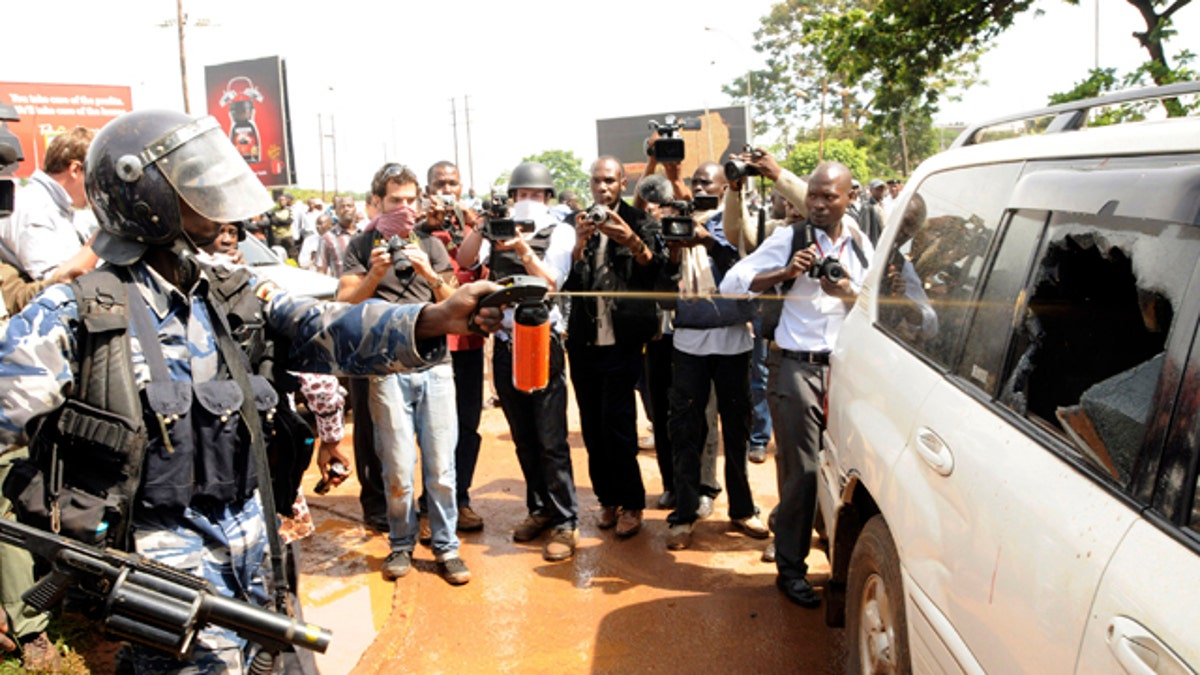
April 28: A Ugandan police officer tear gas opposition leader and former presidential candidate Dr. Kizza Besigye in his car before arresting him in the Kampala city center. Police in Uganda have again arrested the country's top opposition leader during a protest march. An Associated Press reporter who witnessed the arrest says Kizza Besigye locked himself inside his vehicle and that police used an ax and the butts of their guns to smash open the windscreen. Police then fired tear gas into the vehicle. (AP)
KAMPALA, Uganda – Army troops and police fired live bullets at rioting demonstrators in downtown Kampala on Friday, the first time the Uganda's growing protest movement had reached the country's capital. Red Cross officials said at least two people were killed and 120 wounded.
Rioters burned tires in downtown streets as security forces fired tear gas and guns, and a Red Cross spokeswoman said 15 of the wounded and been hit by live bullets. Battles between protesters and police were also reported elsewhere around the country, including at Kasangati, just outside the capital, where the country's top opposition leader lives.
The protests are the first serious demonstrations in sub-Saharan Africa since a wave of anti-government protests swept leaders in Tunisia and Egypt out of power. Ugandan President Yoweri Museveni has vowed repeatedly that his government will not be taken down by protests.
Red Cross spokeswoman Catherine Ntabadde said at least two people were killed and 120 people wounded. Ntabadde said at least 15 people had been wounded by gunfire.
Uganda police spokeswoman Judith Nabakooba said the police were working to contain the demonstrations. She said she did not immediately have a casualty figure.
The breakout of violence came one day after a brutal takedown of the country's top opposition politician, Kizza Besigye. Police cracked open the window of Besigye's vehicle and doused him with tear gas at close range before bundling him into the back of a pickup truck and speeding off.
"They arrested him like a chicken thief. We cannot allow such things to continue. Museveni must go," said Brown Ndese, one of the protesters.
Radio reports in Uganda quoted an aide to Besigye as saying that the opposition leader was in poor health and that arrangements were being made to fly him out of the country for treatment.
Attempts to reach Besigye aides for comment failed.
Besigye has held five "walk to work" demonstrations to protest rising prices and what he calls a corrupt government. On Friday, demonstrators carried posters praising Besigye, and questioned why police needed to use violence to arrest him. Opposition members of parliament have demanded an explanation from the government over his treatment.
Nabakooba said previously that Besigye was arrested for not following police orders and for leading a chaotic demonstration that snarled traffic and saw his supporters hurl stones at passing vehicles.
Earlier this month Besigye was shot in the right hand by what he says was a rubber bullet fired by police. He now wears a thick white cast that reaches halfway up his right arm.
Uganda's Daily Monitor newspaper reported on its website Friday that military forces and police fired live ammunition and tear gas at demonstrators in the eastern town of Mbale, some 200 miles outside Kampala. Demonstrators fought back with rocks.
The U.S. Embassy in Uganda condemned the escalation of violence and called on all protesters to obey the law and cease all destruction of property. The U.S. said senior leaders needed to meet to calm the situation.
"The U.S. Mission in Uganda also urges the Government of Uganda to respect the right of all citizens to peacefully express their views as enshrined by Uganda's constitution. Above all, Ugandan authorities must avoid using excessive force against civilians in this situation. Constructive dialogue is needed now," the U.S. statement said.
Besigye came second in Uganda's February presidential election to Museveni. It was his third straight loss to Museveni and threatened to end his political career. But Uganda has seen huge price spikes in food and fuel in recent months, giving Besigye -- and his "walk to work" protests -- a political resurrection.
Museveni, Uganda's leader for the past 25 years, has vowed to crack down on the protests. Official returns showed him winning 68 percent of the February vote, though Besigye says those returns were falsified and that both he and Museveni got just under 50 percent.
The top U.S. diplomat for Africa, Assistant Secretary of State for African Affairs Johnnie Carson, said he spoke to Uganda's foreign minister on Thursday.
"We have expressed our concern about what appears to be harassment of Dr. Besigye," he said. "I have myself spoken to the Ugandan foreign minister about this and have urged that the Ugandan government act both in a responsible and civil fashion in dealing with the arrest of individuals attempting to carry out peaceful protests."
Besigye told AP in an interview at his home last week that many Ugandans face a "crisis of survival," that the health care system has broken down and that young people cannot find jobs.
He said that Museveni's government is terrified of the protest marches, the reason he has been arrested for walking toward the capital.
Besigye was the president's personal physician before being dismissed for saying in 1999 the government was becoming a one-man dictatorship.
Uganda is a young country, with half its nearly 35 million citizens under 15. An estimated 1.2 million have HIV/AIDS. The average yearly income is just $1,200, though many here have hopes -- and fears -- over newly discovered oil that will soon be pumped. An oil curse has befallen several African countries, providing more incentive for corrupt leaders to remain in power in order to steal from public coffers.




















